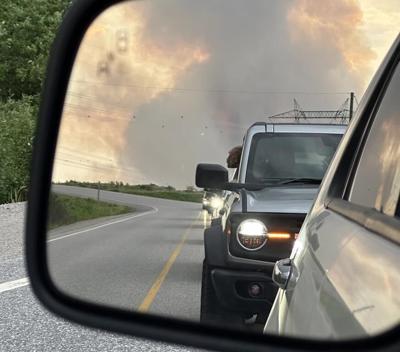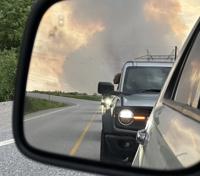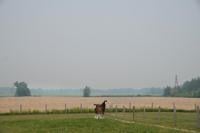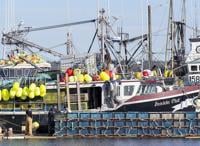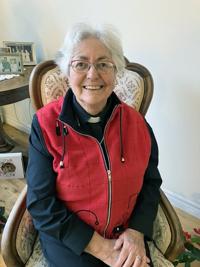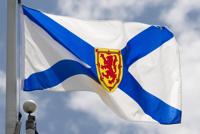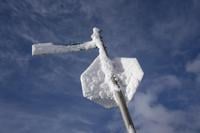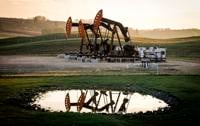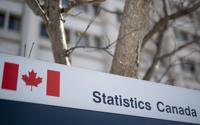ST. JOHN'S, N.L. - A wildfire threatening a town in central Labrador grew suddenly to a raging blaze that advanced two kilometres in about 45 minutes before officials ordered everyone to evacuate Wednesday night, authorities have revealed.
About 750 residents and workers fled Churchill Falls, many driving white-knuckled through a sky-splitting lightning storm toward Happy Valley-Goose Bay, N.L., about three hours away. As of Thursday afternoon, the flames were about six kilometres away from the town, kept at bay by favourable wind conditions and a river, fire officials told reporters.
"The risk is if it jumps the river, and the biggest driver of whether it'll jump the river or not is the wind patterns," Premier Andrew Furey said during a news conference in St. John's. "Right now, there's a favourable wind pattern, but we live in Newfoundland and Labrador, winds change all the time."
Blair Adams, with the province's Fisheries, Forestry and Agriculture Department, concurred. "The rain helped us out this morning, but it was relatively short-lived, and we're certainly concerned about the rest of the day."
An emergency order to evacuate Churchill Falls was texted and emailed to residents at about 7:30 p.m. local time on Wednesday, asking them to pack up and leave within 45 minutes. The town is home to about 700 people, most of whom work at the local hydroelectric generating station, which supplies power to Quebec and Newfoundland and Labrador.
Robert Dawe was among those who fled, and he said cars and trucks were bumper to bumper along the remote, two-lane Trans-Labrador Highway as people made their way east to Happy Valley-Goose Bay. Lightning cracked the sky as the vehicles left behind a spiralling cloud of smoke and drove toward torrential rains falling in Happy Valley-Goose Bay.
"I wasn't surprised because I know the fire was close," Dawe said about the call to evacuate. "But the wind was blowing it closer to town and it flared up. It was under control, but it got worse really fast."
On Wednesday evening, the province's wildfire dashboard showed the blaze encompassed about seven square kilometres. As of Thursday afternoon, it had more than doubled in size, to 16 square kilometres, officials said.
Four water bombers, a number of helicopters and 40 fire fighters were all working to douse the flames. Furey said he asked for help from other provinces through the ºÚÁϳԹÏÍø Interagency Forest Fire Centre. In the meantime, with all of the province's firefighting resources working in Labrador, he announced a ban on all outdoor fires across the island of Newfoundland and throughout the southern and central region of Labrador.
"I know the weather is warm, I know it's nice, I know it's graduation weekend for many," Furey said. "But please, please do not light any fires across the province right now. We just can't risk it."
Jennifer Williams, chief executive of Newfoundland and Labrador Hydro, said a small crew was still on site at the generating station and production levels were normal. There are plans in place to evacuate those workers if needed, she added.
Perry Trimper, the Liberal member of the provincial legislature for the region, said earlier Thursday that more than 500 evacuees had checked in with officials in Happy Valley-Goose Bay. Some were given beds at the YMCA, but most had friends and family they were staying with, he said in an interview.
He said teams of volunteers loaded mattresses into the YMCA on Wednesday night for people fleeing Churchill Falls. Businesses stayed open late to feed them, and residents from all over the community showed up at the YMCA to help out.
And it all happened in the midst of a raging thunder and rainstorm, he said.
"I'll use the word 'apocalyptic,'" Trimper said. "It was a storm none of us have ever witnessed before. And to see people coming from their vehicles in this amazing storm, trying to find a place to stay, it was quite an experience."
There were seven active wildfires in Labrador on Thursday. Four, in the central region, were burning out of control. The remaining three, in the western region, were listed on the provincial wildfire dashboard as "being held," which means they were no longer spreading.
This report by ºÚÁϳԹÏÍø was first published June 20, 2024.

